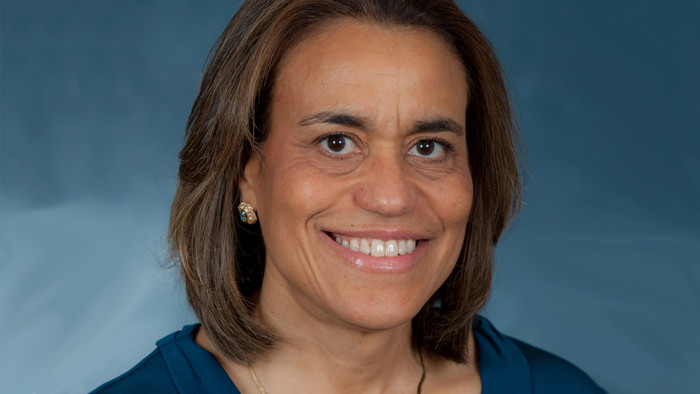Women at business school – Maeve Richard, career adviser

Simply sign up to the Business education myFT Digest -- delivered directly to your inbox.
Maeve Richard is assistant dean and director of Stanford Graduate School of Business Career Management Center. A career adviser since 2013, Ms Richard joined Stanford after working in finance for various industries including banking, investment management and technology. She also has an MBA from the US school.
1. Who is your business hero?
Salman Kahn. He started posting videos on YouTube to explain secondary school maths in 2004. He set up Khan Academy as a non-profit organisation in 2008 and left his position at a hedge fund to run it in 2009. My first exposure to Khan Academy was through its early partnership with Peninsula Bridge, another non-profit that promotes academic and personal success for middle school students from under-resourced communities. Mr Kahn’s strategy was brilliant. He leveraged a free platform. He produced really excellent product. He developed it with the needs of some of the most economically disadvantaged students in Silicon Valley in mind.
2. What is an average day at work like?
When I wake up I reach for my iPhone and check email – personal and professional. The iPhone and all that it makes accessible is far too entertaining. Instantly engaged, I begin responding right away to what’s urgent and important. I do my very best, most inventive thinking in the shower. Throughout the day, I jot down ideas, plans, solutions on index cards that I carry around.
3. What do you enjoy most about your job?
Being held accountable for shaping culture. Culture is the byproduct of the series of decisions, actions and interactions among co-workers and stakeholders over time. It is one of the most powerful factors that affect an employee’s motivation to engage and contribute and the quantity and quality of his or her work. It is also the hardest to manage . . . I mostly rely on explicitly affirming actions and outcomes that are congruent with values of fairness, decency and respect for individuals. Maintaining an emotionally safe work environment and providing for prudent risk-taking is vital.
4. What is your biggest lesson learnt?
When you are succeeding and you are confidently balancing the demands of career, spouse, children, boards and other sundry obligations, you can lose touch with yourself. It was very bewildering when it happened to me. I realised that I had lost touch with my wants. There was very little of what made me “me” remaining.
5. What is the worst job you have ever had?
I was an industrious child and my grandmother, who I loved dearly, offered to pay me a small sum to do a small chore. After finishing it, I discovered I really liked getting paid. We lived in Michigan in a farmhouse with a lean-to chicken shed along the back. I thought about it and figured if I did a really big job, my grandmother would pay me a whole lot of money. I decided to clean out the chicken shed. It took several long days and involved clearing debris, scrabbling with chickens and scraping layers upon layers of chicken crud off all surfaces. I persevered [then] went to my grandmother and asked her what would she pay me? My grandmother said “nothing”. I was stunned. When I asked why, she said she had never agreed to pay me. It was the very worst job ever. I learnt how important it is to get clear – and negotiate – expectations upfront and have since become an expert at doing so.
6. What advice would you give to women in business?
Mentors can have a large positive impact on careers. Plan to be a mentor, but be very discriminating and exercise care before agreeing to mentor someone. Be open to and actively interested in identifying and forging a meaningful relationship with someone who is interested in mentoring you. Mentors are born, not made. A mentor-mentee relationship is of mutual value and advantage, even though what is exchanged is very different on each side of the relationship.
7. How do you deal with male-dominated environments?
As soon as possible, I discover the “how to” get along and ahead within the culture and then get very good at doing so. My great, good fortune was to grow up with brothers, male cousins and many more uncles than aunts. I have always felt at ease in the various male-dominated organisations I’ve worked for. Men scent uneasiness and take advantage of it. I’m tall and seated or standing I’m able to look men directly in the eye. Switching to advice, even if you are not tall, project tall.
8. What is your favourite business book?
Crossing the Chasm: Marketing and Selling Disruptive Products to Mainstream Customers by Geoffrey A. Moore. I love the S-curve, which is one of the best frameworks. The analysis was predictive and is still relevant. Further, it has allowed me to think creatively when I started wondering how individuals in crisis or in wastelands can transition back into wellbeing and significance.
9. If you could do it all again, what would you do differently?
I would focus so much less on others’ opinions of me and my efforts. No doubt, I worked more than was necessary and produced a vein of work designed to appease fickle, arbitrary and mercurial tastes. I’ve shifted my comparative standard away from external validation to an internal one of being my best and doing my best.
10. What is your plan B?
I would sing. Life with its meandering path through meadows and patches of adversities, gives singers potent emotional depth that moves an audience. I’ve sung before countless audiences and being honest, I really would like to sing to a few more – to walk on stage and peer squinting beyond the lights and hope for a night of magic connection.
Comments